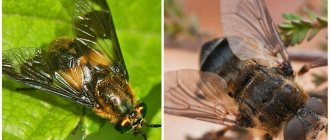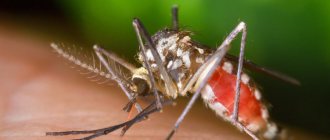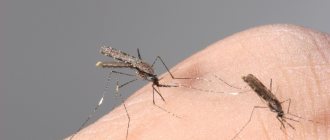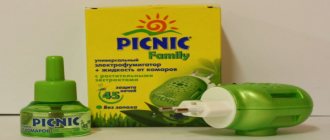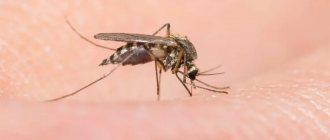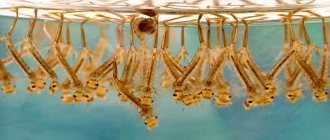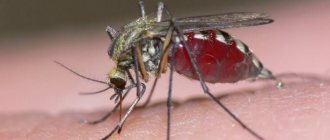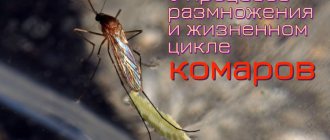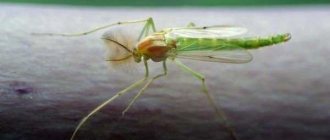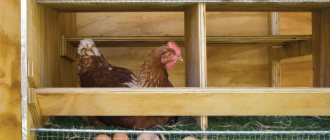During the warm season, everyone has encountered mosquitoes. Bloodsuckers spoil your vacation in nature, at the dacha, and prevent you from taking a normal walk in the forest or sitting near the lake. But it happens that in one area there are a lot of mosquitoes, but in another there are only a few individuals flying. What is this connected with? The activity of pests depends on the species, time of day and location. Some places attract bloodsuckers more strongly, for example, swampy areas, salt marshes, places where there is a lot of standing water, and excavator dumps. Let’s take a closer look at what mosquitoes like and don’t like in nature.
Air temperature
Mosquitoes don't like heat or cold. What weather do mosquitoes like? The optimal temperature for their life and development is +20 °C. But bloodsuckers are active already at +12 °C. The lower the temperature, the slower the insects develop and practically lose their ability to reproduce. Pests don't like high temperatures either. Why don't mosquitoes like heat? In the heat, their thin, weightless body dries out on the fly. But if you don’t see them in the city on a hot day, you should go hiking or fishing and have to fight off the insects.
If in the summer the air temperature stays above plus 25 degrees Celsius for several days, there are noticeably fewer mosquitoes.
Mosquitoes are afraid of the sun and hide in the shade of trees, grass, and bushes. But if they are disturbed, they will attack, despite the heat, especially since the dense foliage reliably protects them from the direct rays of the sun in the forest.
Some people think that mosquitoes love the heat, since they are active in the summer, but in fact this is not so, they do not like the sun and are even afraid of it.
In summer, the risk of attack is higher in the morning and evening. During the day they seek coolness and sit in shelters. There are species of mosquitoes that are active all night.
With the onset of cold weather, mosquitoes disappear. It cannot be said that mosquitoes are afraid of the cold, because they do not die, but spend the winter, entering diapause in the adult, pupal or egg stages.
Adult insects hide in tree hollows, animal burrows, tree trunk cavities and other places protected from the cold. Only females hibernate; nature has not given males such a privilege.
The eggs wait for warm days in the soil, mud at the bottom of reservoirs. Pupae are attached to aquatic vegetation or are also buried in silt and mud. After all, even in severe winters, only the top layer of reservoirs freezes.
In spring, as warm days arrive, the development of larvae continues. New individuals emerge from the eggs.
What temperature do mosquitoes not like? At temperatures from +16 to +25 °C they feel good. Temperatures outside this range negatively affect the life of insects.
Mosquito season
Blood-sucking squeaks breed all summer, but their largest numbers occur in August. This month the daylight hours are shorter, and before the sun sets, mosquitoes appear. August in central Russia is characterized by cool evenings and high humidity. And these are optimal conditions for midges and mosquitoes.
The mosquito season in the Moscow region usually begins in the second half of summer. During the day, insects live without food, hiding from the heat in forests and parks, and in the evening they go out hunting and annoy them with their bites and squeaks. Protective means will help you save yourself from a mosquito invasion. It is difficult to say exactly in what month mosquitoes disappear. It depends on weather conditions. Usually in September their numbers decrease noticeably, and after the first frost they disappear.
Water, humidity
The presence of humidity is one of the main conditions for the development of mosquitoes. Why do mosquitoes love humidity and dampness? Insect larvae develop in damp soil or water. In dry conditions, the population size decreases significantly. Therefore, pests live in colonies along the banks of rivers, lakes and swamps.
In summer, in warm and damp weather, mosquitoes breed at a high rate. In two weeks, the insect goes through all stages of development.
The larvae even overwinter in the water; development is completed at +15 degrees, then they move to the shore.
Why mosquitoes love water is because it is a medium for raising offspring. The larvae, after emerging from the egg, feed on microorganisms in the water. They hang upside down above the surface, and swallow air with a special tube. After the larva becomes a pupa, it also spends all its time in the water. Insects come to land in the imago stage. They inhabit coastal vegetation and swarm near the breeding site.
Bloodsuckers are not picky about the quality of water; the more microorganisms, the more food, but the best conditions are swamps, where water fluctuations are minimal.
Not only ponds and swamps are suitable for mosquitoes to breed; these can be areas with a small amount of water.
Lighting
Do mosquitoes like light or darkness? This question cannot be answered unambiguously. Many species of mosquitoes are active after dark, and during the day they hide from the sun in shelters, as they are afraid of drying out and dying. It's not the lighting, it's the heat.
Light attracts mosquitoes, but not bright sunlight. During the day they prefer to hide in the shadows, and become more active at dusk.
Are female mosquitoes afraid of light? After all, it happens at night, a mosquito squeaks above your ear, but as soon as you turn on the light, it immediately disappears. This is not a fear of light, but a reaction to changing lighting.
Moreover, it has been noticed that insects tend to fly out of the twilight towards the light. However, they are more attracted to the heat emitted by the light source. For example, they see a fire in infrared radiation as a source of food. But the smoke from the fire will keep pests away. Only females fly to the light; males are not interested in it.
When going fishing at night or in the forest to pick mushrooms, take with you repellents, essential oils that insects do not like, and use folk remedies. After all, mosquitoes are not afraid of people; we are a source of food for them.
Facts about the nutrition process
The female's mouthparts are piercing-sucking. Initially it looks very simple - a long proboscis with which the insect pierces the skin and sucks in blood. If you understand the structure of the mouth in detail, everything looks much more complicated.
The oral apparatus consists of an upper and lower jaw, elongated lips, a sucking tube, and 6 sharp needles. Two needles end in compacted bristles. They are called teeth or something like them. Only 50 pieces. Initially, the mosquito does not pierce the skin, but gnaws it, and only then inserts its proboscis. The needles hold the wound open, allowing food to flow easily.
Saliva contains a special secretion that prevents blood from clotting. Feeding lasts about 5 minutes. If the female is not disturbed from eating, she will calmly fly away and will not bother her further.
Interesting!
The experiment, conducted in the Canadian tundra, surprised many. In a second, a person with open arms and legs is bitten by about 9 thousand mosquitoes. Within 2 hours, half of all blood is lost. In this state, a person can die from anemia. And 1,200,000 mosquitoes are capable of sucking out absolutely all the blood.
Wind and rain
What mosquitoes are afraid of outdoors is strong winds. In nature, most species of bloodsuckers fly at a level of 10-15 meters above the surface of the earth, as they feed on the blood of animals. But the wind can carry their tiny bodies long distances.
So, if you need to build a hunting hut in the forest, it is better to choose a clearing that is well blown by the winds.
But mosquitoes are not afraid of rain, contrary to popular belief. Insects successfully move under raindrops. Only heavy rainfall can force them to take cover, otherwise walking in the rain can be deadly.
Natural refuge
Where do mosquitoes go in winter? Certain types of insects, including female mosquitoes, live in diapause, choosing more or less warm natural shelter. The most common ones are a rodent hole, cavities in a tree trunk, etc.
They can also choose structures made by man - the cracks that exist between the logs of wooden houses, in the cavities between siding and frames, a garage, a basement, a basement. It should be noted that wintering is characteristic only of female mosquitoes. Male mosquitoes are deprived of this privilege by nature.
Sounds
What sound do mosquitoes not like? Insects are repelled by the sound of the rustling wings of a dragonfly and the sonar of bats. Natural predators of mosquitoes eat them in large quantities. Studies have been conducted, one bat eats more than six hundred mosquitoes in an hour. It is not surprising that the sounds that predators make scare away insects. The same applies to birds; no studies have been conducted, but experts say that the tit eats insects equal in weight to its own.
Thus, ultrasonic repellers imitate the sounds of predators. The creators of the devices say that mosquitoes do not like a frequency of 30 kHz; it plunges them into panic.
It remains a mystery whether ultrasound actually works on mosquitoes. But in any case, the sound of danger scares away animals and insects.
How long can an insect live after biting a person?
They bite people, only females. This feature is due to the specific structure of the female’s oral cavity. Males only need to feed on plant sap.
Females need blood to replenish wasted strength. If she does not replenish them, then after laying eggs she will simply die, and only a few of the offspring will be able to survive.
In the case when the victim is nearby and replenishing energy does not become a problem for the insect, it can calmly live its entire life cycle, actively reproducing.
Color
Scientists from America conducted a strange study that actually turned out to be useful. They tracked the mosquitoes' reaction to colors. They found out what color mosquitoes (and maybe midges) don’t like. As a result of the experiment, it turned out that the insects did not approach people wearing yellow clothes. They are not attracted to all shades of green.
But, mosquitoes love red, blue and black. Due to poor vision, it is easier for them to find dark silhouettes.
Knowing what color mosquitoes like, you can protect yourself from bloodsuckers without repellents. It is enough to choose clothes of suitable shades.
Habitat
Culex pipiens is of African origin. Over the past 7 centuries, this species has spread throughout the world. In Russia, the common mosquito is found in all regions except the Arctic. In Northern Europe, Culexes are found everywhere except Iceland. Mosquitoes are especially fond of areas with a humid temperate climate and a large number of bodies of water. In many regions, insects behave more aggressively and form huge populations. In the taiga, where the bloodsucker lives in large numbers, people often suffer from massive bites. The only chance to get rid of mosquitoes for residents of taiga villages is to purchase gas traps for the mass destruction of bloodsuckers.
Vegetation
For rest and shelter, insects use the dense foliage of trees, tall grass, and shrubs. They are attracted to various weeds. But there is a tree that mosquitoes do not like; they are afraid of it. This is a tree with a pungent odor of fruits or inflorescences.
Mosquitoes avoid:
- Rowan
- Bird cherry
- Walnut
- Elderberry
- Conifers.
There are plants that lure insects with their scent and destroy them. These are plants that are predators - butterwort, sundew, flycatcher, dewweed.
Flowers that mosquitoes do not like are calendula, geranium, ageratum.
Insects do not like the smell of grass with a pungent aroma. Mosquitoes and midges do not like this. For the same reason, mosquitoes do not like the smell of vanilla. Vanilla-based folk remedies for repelling mosquitoes have been successfully used, which can be used both at home and outdoors. These are essential oils, sticks or confectionery powder. Mosquitoes do not like vanillin, but use it with caution; you may develop an allergy to vanilla.

